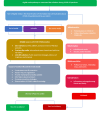Effects of COVID-19 Illness and Vaccination Infodemic Through Mobile Health, Social Media, and Electronic Media on the Attitudes of Caregivers and Health Care Providers in Pakistan: Qualitative Exploratory Study
- PMID: 39231430
- PMCID: PMC11411225
- DOI: 10.2196/49366
Effects of COVID-19 Illness and Vaccination Infodemic Through Mobile Health, Social Media, and Electronic Media on the Attitudes of Caregivers and Health Care Providers in Pakistan: Qualitative Exploratory Study
Abstract
Background: The COVID-19 pandemic has had a significant impact on different countries because of which various health and safety measures were implemented, with digital media playing a pivotal role. However, digital media also pose significant concerns such as misinformation and lack of direction.
Objective: We aimed to explore the effects of COVID-19-related infodemics through digital, social, and electronic media on the vaccine-related attitudes of caregivers and health care providers in Pakistan.
Methods: This study employs a qualitative exploratory study design with purposive sampling strategies, and it was conducted at 3 primary health care facilities in the province of Sindh, Pakistan. Seven focus group discussions with health care providers and 60 in-depth interviews with caregivers were conducted using semistructured interviews through virtual platforms (ConnectOnCall and Zoom). Transcripts were analyzed through thematic analysis.
Results: Our study reveals the pivotal role of electronic media, mobile health (mHealth), and social media during the COVID-19 pandemic. Four major themes were identified: (1) sources of information on COVID-19 and its vaccination, (2) electronic media value and misleading communication, (3) mHealth leveraging and limitations during COVID-19, and (4) social media influence and barriers during COVID-19. Health care providers and caregivers reported that the common sources of information were electronic media and mHealth, followed by social media. Some participants also used global media for more reliable information related to COVID-19. mHealth solutions such as public awareness messages, videos, call ringtones, and helplines promoted COVID-19 prevention techniques and vaccine registration. However, the overwhelming influx of news and sociobehavioral narratives, including misinformation/disinformation through social media such as WhatsApp, Facebook, and Twitter, were found to be the primary enablers of vaccine-related infodemics. Electronic media and mHealth were utilized more widely to promote information and communication on the COVID-19 pandemic and vaccination. However, social media and electronic media-driven infodemics were identified as the major factors for misinformation related to COVID-19 and vaccine hesitancy. Further, we found a digital divide between the urban and rural populations, with the use of electronic media in rural settings and social media in urban settings.
Conclusions: In a resource-constrained setting like Pakistan, the usage of mHealth, social media, and electronic media for information spread (both factual and mis/disinformation) related to COVID-19 and its vaccination had a significant impact on attitudes toward COVID-19 vaccination. Based on the qualitative findings, we generated a model of digital communications and information dissemination to increase knowledge about COVID-19 and its prevention measures, including vaccination, which can be replicated in similar settings for other disease burdens and related infodemics. Further, to mitigate the infodemics, both digital and nondigital interventions are needed at a larger scale.
Keywords: Pakistan; electronic media; infodemics; infodemiology; mHealth; misinformation; mobile phone; social media; vaccination.
©Abdul Momin Kazi, Nazia Ahsan, Rawshan Jabeen, Raheel Allana, Saima Jamal, Muhammad Ayub Khan Mughal, Kathryn L Hopkins, Fauzia Aman Malik. Originally published in JMIR Infodemiology (https://infodemiology.jmir.org), 04.09.2024.
Conflict of interest statement
Conflicts of Interest: None declared.
Figures



References
-
- Khattab MF, Abou-Madawi AM. Current effect of COVID-19 global pandemic on the professional and life profiles of the Egyptian spine surgeons. SICOT J. 2020;6:31. doi: 10.1051/sicotj/2020029. https://europepmc.org/abstract/MED/32819456 sicotj200036 - DOI - PMC - PubMed
-
- Nasajpour M, Pouriyeh S, Parizi RM, Dorodchi M, Valero M, Arabnia HR. Internet of things for current COVID-19 and future pandemics: an exploratory study. J Healthc Inform Res. 2020;4(4):325–364. doi: 10.1007/s41666-020-00080-6. https://europepmc.org/abstract/MED/33204938 80 - DOI - PMC - PubMed
-
- Zhao Y, Cheng S, Yu X, Xu H. Chinese public's attention to the COVID-19 epidemic on social media: observational descriptive study. J Med Internet Res. 2020 May 04;22(5):e18825. doi: 10.2196/18825. https://www.jmir.org/2020/5/e18825/ v22i5e18825 - DOI - PMC - PubMed
-
- Appel G, Grewal L, Hadi R, Stephen AT. The future of social media in marketing. J Acad Mark Sci. 2020;48(1):79–95. doi: 10.1007/s11747-019-00695-1. https://europepmc.org/abstract/MED/32431463 695 - DOI - PMC - PubMed
-
- Purnat TD, Vacca P, Czerniak C, Ball S, Burzo S, Zecchin T, Wright A, Bezbaruah S, Tanggol F, Dubé ?, Labbé F, Dionne M, Lamichhane J, Mahajan A, Briand S, Nguyen T. Infodemic signal detection during the COVID-19 pandemic: development of a methodology for identifying potential information voids in online conversations. JMIR Infodemiology. 2021 Jul 28;1(1):e30971. doi: 10.2196/30971. - DOI - PMC - PubMed
MeSH terms
Substances
LinkOut - more resources
Full Text Sources
Medical
Miscellaneous

